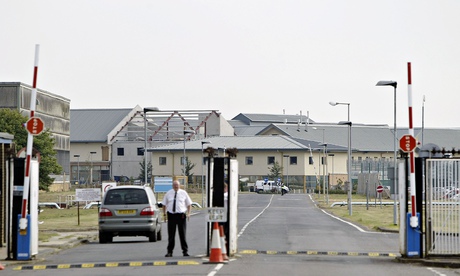Violence Against Women
Source: The Guardian
Three years ago, Margaret* was living a normal life in the eastern part of the Democratic Republic of the Congo, running a restaurant and bringing up three children. One evening, armed men came to her door. They took her to an abandoned house and forced her into a room with four other women; all of them naked.
"There was a pile of old doors in the room, stacked up to make a kind of bed. One of the men pushed me onto it. Two men held my legs while a third held my arms. The fourth man then raped me. After that they all took turns. When they finished they left. I felt pain all over my body."
She was kept in that house for weeks, sometimes tied up, and raped over and over again. Two of the women died during captivity. Eventually, a man who came to wash the room talked to her, and made contact with her pastor, who paid for her release and took her to Uganda. From there she paid an agent to bring her to Europe. She didn't know her destination was London until she was boarding the aeroplane. 'I was very scared. I didn't even speak much English.'
Once in London, she claimed asylum and was held in Yarl's Wood detention centre. There, the fact of being imprisoned again and guarded by men brought her to the brink of collapse.
"They have taken my sleeping pills," she told Women for Refugee Women (WRW). "At the moment of falling asleep, I wake with my heart pounding." She was so depressed that she was placed on suicide watch. 'When the men watch me it makes me have so many bad feelings about myself and my body.' While in Yarl's Wood, she was watching the TV when the screen showed actor and UN ambassador Angelina Jolie and the British foreign secretary, William Hague, visiting her area of Congo. "Women around me were shouting at the television: 'There are women in Congo here now in Yarl's Wood!' "

Margaret's story will be read at the Summit to End Sexual Violence in Conflict, a four-day event hosted by Hague and Jolie that starts in London on Tuesday. It shows why the summit is so important. It also shows that this is not just a foreign policy issue. Nobody is suggesting that more survivors should flee to the west; solutions must be implemented on the ground. However, some will cross borders – though most go only to a neighbouring country – and it is vital that those who do come here are treated with dignity. WRW research found that one in five of the women surveyed, who had claimed asylum and been held in detention in the UK, had tried to kill herself, and nearly one in three had been on suicide watch in detention. Most of the women we spoke to had been guarded by men in detention, and most of them said that made them feel uncomfortable. The detention of asylum seekers is completely unnecessary – their cases could easily be considered while they are living in the community – yet the UK Home Office locked up nearly 2,000 women who had sought asylum in 2012.
Women for Refugee Women will be at the summit with a colourful quilt that the Women's Institute have made to show solidarity with women in detention. It is stitched all over with messages of support for refugee women and a smaller version of it will be presented to Angelina Jolie. We hope this will remind the summit's organisers that it isn't just women overseas who should be taken seriously as witnesses and survivors, but the ones who continue to suffer when they're in the UK. Theresa May at the Home Office needs to recognise the truth that has been recognised by William Hague at the Foreign Office; survivors of sexual violence need protection and justice. It's time to stop locking up rape survivors who come to the UK for safety.
